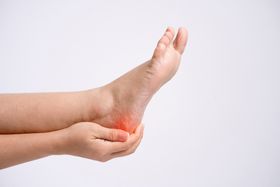Which Athletes Can Benefit From Wearing Orthotics?
Updated September 18, 2024

Exercises consist of different levels of impact, which places varying degrees of stress on your feet that force your foot to function in different ways. As such, some athletes benefit more from orthotics than others, making the use of custom-made orthotics extremely essential in athletes playing certain types of sports.
Athletes have a higher demand physically due to the nature of their sport and hence are more prone to injuries of the foot, legs, and other body parts. This is why it is highly beneficial for certain athletes like soccer players, runners, basketball players, football players, and power-walkers to wear orthotics to have the proper support and foot biomechanics as a preventative measure.
» Which orthotics should athletes wear? Upstep offers a variety of custom orthotics, including multi-sports custom orthotics and running custom orthotics
Which Types of Exercise Require Which Orthotics?
Since the demand for different exercises is different, the type of orthotics to be worn needs to vary in order to fit and meet the stress of a particular sport on your body. The benefits of foot orthoses for athletes, while different, can be found to improve sports performance in every sport.
Exercises involving running and jogging need orthotics specifically designed for shock absorption when the heel contacts the ground, thus making it ready for the next phase of running, which is the forefoot push-off. Soft orthotics are generally used for the same.
Whereas sprinters need to wear orthotics that help control the function of their forefoot, such as a rigid orthotic composed of a firm material. They can also use sprint insoles specially designed for sprinters. The same is true for golfers who experience prolonged stress on their feet without too much shock. Golfers should endeavor to use the best insoles for golf shoes, particularly if they have lower back pain. This is also applicable to weightlifters whose feet regularly undergo stress.
High-impact activities such as jumping can be eased through the use of shock-absorbing orthotics. In this sense, insoles can be highly beneficial to basketball players and tennis players who want to prevent plantar fasciitis.
The best insoles for football cleats offer shock absorption, help the boots fit better, turn the shock into energy, and cushion the foot from the impact of contact with a hard surface.
» Still not convinced about the effectiveness of orthotics? Discover why athletes experience different benefits from orthotics
Should All Athletes Get Orthotics?
After all this, you might be wondering: "Should I wear orthotics while exercising?"
The fact of the matter is that there is no harm in having a custom-made orthotic insole for your daily use and sporting activities, especially if you are suffering from pain or any other dysfunction of the feet. It is also important to note that custom orthotics are better than over-the-counter (OTC) insoles as they can be molded to the specifications of your foot, whereas generic ones are certain to have inaccuracies that can hurt your performance.
Instead, custom orthotics will help deal with the currently altered foot biomechanics, giving added support to your arches, taking pressure off the feet, and aiding in preventing any future injuries that may happen.
It can potentially be harmful to run without orthotics if you are predisposed to foot conditions. Running without support could have adverse effects and wear and tear on your feet, making orthotics beneficial in most physical activities, especially for athletes and people suffering from malalignment of the feet.
» Feeling heel discomfort after running? Read more about the most common causes of heel pain
What About Exercises That Do Not Require Footwear and Orthotics?
Exercises that do not require putting any pressure on the feet, like open kinetic chain exercises, can be safely performed without orthotics or even barefoot. Yoga can also be performed safely while barefoot and without orthotics.
Although, when it comes to closed kinetic chain exercises where your feet are in contact with the ground while exercising, they may get added pressure during the movements. As such, they should always be performed while wearing the necessary good-fit shoes and custom-made orthotics.
However, suppose one doesn't have any pain or discomfort in the feet while performing workouts in the gym or walking. In that case, they do not necessarily require shoes with additional custom-made orthotics. However, they can still be worn due to their arch support benefits, cushioning, and effectiveness in preventing any possible future injuries, aches, and pains.
It is essential to change the orthotics after a period depending upon the wear and tear they have undergone, especially if you experience pain after wearing orthotics.
Custom-made orthotics generally last for about 2 - 3 years. However, some may need a replacement after one year, depending upon the condition of the orthotic. Hence, it is essential to consult your physiotherapist or podiatrist before using the existing orthotic in your exercise shoes.
How to Know if You Need Orthotics When Exercising
As mentioned above, you might not necessarily need orthotics in every scenario, especially if you have no foot abnormalities and don't experience any pain. Although you might not need them, you might still experience some benefits from using orthotics, even more so if you use them during strenuous exercise. However, if you experience any consistent pain of any kind as a result of training, it is advised that you consult a podiatrist and try and purchase a pair of custom orthotics.
» Still unsure whether custom orthotics are for you? Read the running custom orthotics review








